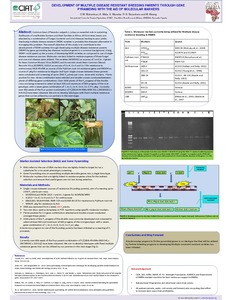Development of multiple disease resistant breeding parents through gene pyramiding with the aid of molecular markers
Common bean (Phaseolus vulgaris L.) plays an essential role in sustaining livelihoods of smallholder farmers and their families in Africa. At farm level, beans are attacked by a combination of fungal, bacterial and viral diseases leading to poor yields.
Deploying multiple disease resistant (MDR) varieties is probably the cheapest alternative in managing this problem. The overall objective of this study is to contribute to the development of MDR varieties through developing multiple disease resistance parents (MDRP) by gene pyramiding key diseases resistance genes in a common background. Using MDRP could speed up the process of developing MDR varieties as compared to use of single disease resistance sources. Molecular markers linked to resistance genes of three fungal and one viral disease were utilized. The varieties MCM5001 as sources of I and bc‐ 3 genes
for Bean Common Mosaic Virus (BCMV) and its necrotic strain Bean Common Mosaic Necrotic Virus (BCMNV); G2333 as sources of Co‐4, Co‐5 and Co‐7 for resistance to anthracnose; MLB‐49‐89A as source of the Pythium root rot resistance gene and MEX54 as source of phg for resistance to Angular leaf Spot∙ Single crosses between these parents were conducted and screening of up to 1500 F2 plants per cross done with markers. Plants positive for two ‐three combination were selected and double crosses conducted between plants of differing gene combinations. Over 3000 plants of the F2 progeny of the double cross are being screened to select at least 500 and maximum of 800 progeny of the root genotype with a seven gene combination of I, bc‐3, Co‐4, Co‐5, Co‐7, Prr, phg. Currently over 580 seeds of the four parent combination of F1[(MLB‐49‐89Ax MEX 54) x (MCM5001 x G2333)] have been obtained. We aim to develop ideotypes with fixed multiple resistance genes that can be utilized by our partners in the next stage.

